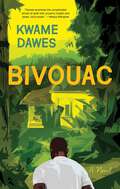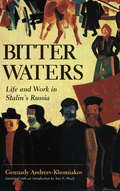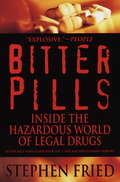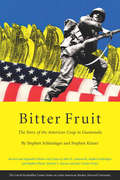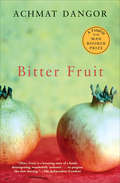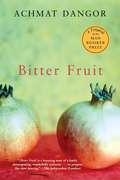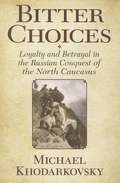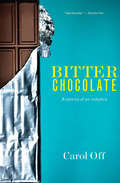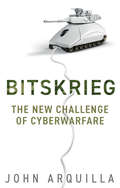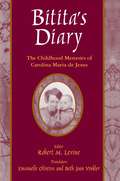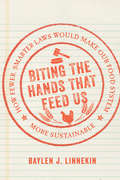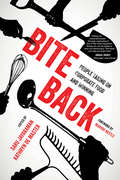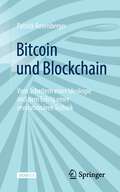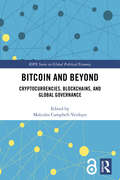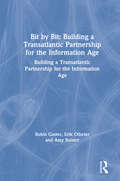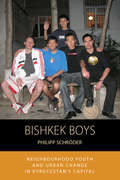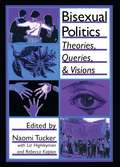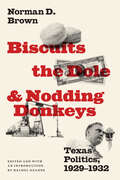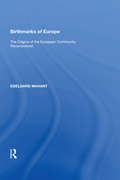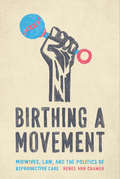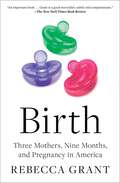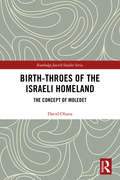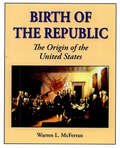- Table View
- List View
Bivouac
by Kwame DawesThe death of a Jamaican man's father raises questions about the father's political endeavors, and about the plight of 1980s Jamaica. Kwame Dawes has been named a 2019 Windham-Campbell Prize Recipient in poetry "Few other novels encaps
Bitter Waters: Life And Work In Stalin's Russia Kindle Edition
by Gennady M. Andreev-Khomiakov Ann HealyOne dusty summer day in 1935, a young writer named Gennady Andreev-Khomiakov was released from the Siberian labor camp where he had spent the last eight years of his life. His total assets amounted to 25 rubles, a loaf of bread, five dried herrings, and the papers identifying him as a convicted "enemy of the people. " From this hard-pressed beginning, Andreev-Khomiakov would eventually work his way into a series of jobs that would allow him to travel and see more of ordinary life and work in the Soviet Union of the 1930s than most of his fellow Soviet citizens would ever have dreamed possible. Capitalizing on this rare opportunity, Bitter Waters is Andreev-Khomiakov's eyewitness account of those tumultuous years, a time when titanic forces were shaping the course of Russian history. Later to become a successful writer and editor in the Russian émigré community in the 1950s and 1960s, Andreev-Khomiakov brilliantly uses this memoir to explore many aspects of Stalinist society. Forced collectivization, Five Year Plans, purges, and the questionable achievements of "shock worker brigades" are only part of this story. Andreev-Khomiakov exposes the Soviet economy as little more than a web of corruption, a system that largely functioned through bribery, barter, and brute force--and that fell into temporary chaos when the German army suddenly invaded in 1941. Bitter Waters may be most valuable for what it reveals about Russian society during the tumultuous 1930s. From remote provincial centers and rural areas, to the best and worst of Moscow and Leningrad, Andreev-Khomiakov's series of deftly drawn sketches of people, places, and events provide a unique window on the hard daily lives of the people who built Stalin's Soviet Union.
Bitter Pills: Inside the Hazardous World of Legal Drugs
by Stephen FriedWe take our medicines on faith. We assume our doctors are well-informed, our drug companies scrupulous, our FDA diligent--and our medications safe. All too often we're wrong. Just how wrong is documented in this critically acclaimed portrait of the international pharmaceutical industry by one of our most highly respected investigative journalists.According to the Journal of the American Medical Association (JAMA), adverse drug reactions are the fourth leading cause of death in America. Reactions to prescription and over-the-counter medications kill far more people annually than all illegal drug use combined.Stephen Fried's wife took a pill for a minor infection--and ended up in the emergency room. Some drug reactions go away in a few hours or days. Diane's did not. This emotionally wrenching experience launched Fried into a five-year examination of the entire pharmaceutical industry, the most profitable legal business in the world. Rigorously documented, Bitter Pills is a full-scale portrait of pill making and pill taking in America today, presented through the powerful human drama of doctors, patients, drug companies, the FDA, and government regulators as they war for control of our medicine cabinets.From the Trade Paperback edition.
Bitter Fruit: The Story Of The American Coup In Guatemala (Series On Latin American Studies #4)
by Stephen Schlesinger & Stephen KinzerBitter Fruit is a comprehensive and insightful account of the CIA operation to overthrow the democratically elected government of Jacobo Arbenz of Guatemala in 1954. First published in 1982, this book has become a classic, a textbook case of the relationship between the United States and the Third World. The authors make extensive use of U.S. government documents and interviews with former CIA and other officials. It is a warning of what happens when the United States abuses its power.
Bitter Fruit (Books That Changed the World)
by Achmat DangorA Man Booker Prize finalist. &“[A] deeply unsettling novel about the new South Africa . . . The people and their stories are unforgettable&” (Booklist, starred review). With the publication of Kafka&’s Curse, Achmat Dangor established himself as an utterly singular voice in South African fiction. His new novel, a finalist for the Man Booker Prize and the IMPAC-Dublin Literary Award, is a clear-eyed, witty, yet deeply serious look at South Africa&’s political history and its damaging legacy in the lives of those who live there. The last time Silas Ali encountered Lt. Du Boise, Silas was locked in the back of a police van and the lieutenant was conducting a vicious assault on Silas&’s wife, Lydia, in revenge for her husband&’s participation in Nelson Mandela&’s African National Congress. When Silas sees Du Boise by chance twenty years later, as the Truth and Reconciliation Commission is about to deliver its report, crimes from the past erupt into the present, splintering the Alis&’ fragile peace. Meanwhile Silas and Lydia&’s son, Mikey, a thoroughly contemporary young hip-hop lothario, contends in unforeseen ways with his parents&’ pasts. &“In the vein of J.M. Coetzee&’s novels, but from the perspective of black South Africans,&” Bitter Fruit is a harrowing story of a brittle family on the crossroads of history and a fearless skewering of the pieties of revolutionary movements (Publishers Weekly). &“A haunting story of a family disintegrating, wonderfully authentic . . . its progress like slow dancing.&” —The Independent &“Bitter Fruit has a shocking ability to surprise the reader with the persistence of racial feeling in South Africa.&” —The Guardian
Bitter Fruit
by Achmat DangorThe last time Silas Ali saw Lieutenant Du Boise, he was locked in the back of a police van and the lieutenant was assaulting Silas's wife. When he sees Du Boise twenty years later, past crimes erupt.
Bitter Choices: Loyalty And Betrayal In The Russian Conquest Of The North Caucasus
by Michael KhodarkovskyRussia's attempt to consolidate its authority in the North Caucasus has exerted a terrible price on both sides since the mid-nineteenth century. Michael Khodarkovsky's book tells the story of a single man with multiple allegiances and provides a concise and compelling history of the mountainous region between the Black and Caspian seas. After forays beginning in the late 1500s, Russia tenuously conquered the peoples of the region in the 1850s; the campaign was defined by a cruelty on both sides that established a pattern repeated in our own time, particularly in Chechnya. At the center of Khodarkovsky's sweeping account is Semen Atarshchikov (1807-1845). His father was a Chechen translator in the Russian army, and Atarshchikov grew up with roots in both Russian and Chechen cultures. His facility with local languages earned him quick promotion in the Russian army. Atarshchikov enjoyed the confidence of his superiors, yet he saw the violence that the Russians inflicted on the native population and was torn between his duties as a Russian officer and his affinity with the highlanders. Twice he deserted the army to join the highlanders in raids against his former colleagues. In the end he was betrayed by a compatriot who sought to gain favor with the Russians by killing the infamous Atarshchikov. Khodarkovsky places Atarshchikov's life in a rich context: we learn a great deal about the region's geography, its peoples, their history, and their conflicts with both the Russians and one another. Khodarkovsky reveals disputes among the Russian commanders and the policies they advocated; some argued for humane approaches but always lost out to those who preferred more violent means. Like Hadji Murat--the hero of Tolstoy's last great work--Atarshchikov moved back and forth between Russian and local allegiances; his biography is the story of the North Caucasus, one as relevant today as in the nineteenth century.
Bitter Chocolate: Anatomy of an Industry
by Carol OffThis shocking exposé of the corruption and exploitation at the heart of the multibillion-dollar cocoa industry is &“an astounding eye-opener that takes no prisoners&” (Quill & Quire, starred review). Bitter Chocolate is both an absorbing social history and a passionate investigation into an industry that has institutionalized abuse as it indulges our whims. Award-winning journalist Carol Off traces the fascinating evolution of chocolate from the sixteenth century banquet table of Montezuma&’s Aztec court to the bustling factories of Hershey, Cadbury, and Mars. In what will be a shocking revelation to many, Off exposes how slavery and injustice remain a key aspect of its production even today. In the Ivory Coast, the world&’s leading producer of cocoa beans, profits from the multibillion-dollar chocolate industry fuel bloody civil war and widespread corruption. Faced with pressure from a crushing &“cocoa cartel&” demanding more beans for less money, poor farmers have turned to the cheapest labor pool possible: thousands of indentured children who pick the beans but have never themselves known the taste of chocolate. &“Bitter Chocolate is less a book about chocolate than it is a study of racism, imperialism and oppression as told through the lens of a single commodity.&” —The Globe and Mail (Toronto)
Bitskrieg: The New Challenge of Cyberwarfare
by John ArquillaNew technologies are changing how we protect our citizens and wage our wars. Among militaries, everything taken for granted about the ability to maneuver and fight is now undermined by vulnerability to “weapons of mass disruption”: cutting-edge computer worms, viruses, and invasive robot networks. At home, billions of household appliances and other “smart” items that form the Internet of Things risk being taken over, then added to the ranks of massive, malicious “zombie” armies. The age of Bitskrieg is here, bringing vexing threats that range from the business sector to the battlefield. In this new book, world-renowned cybersecurity expert John Arquilla looks unflinchingly at the challenges posed by cyberwarfare – which he argues have been neither met nor mastered. He offers fresh solutions for protecting against enemies that are often anonymous, unpredictable, and capable of projecting force and influence vastly disproportionate to their size, strength, or wealth. The changes called for require radical rethinking of military and security affairs, diplomacy, and even the routines of our daily lives.
Bitita's Diary: The Autobiography of Carolina Maria de Jesus (Latin American Realities Ser.)
by Robert M. Levine Carolina Maria De Jesus Beth Joan Vinkler Emanuelle OliveiraCarolina Maria de Jesus (1914-1977), nicknamed Bitita, was a destitute black Brazilian woman born in the rural interior who migrated to the industrial city of Sao Paulo. This is her autobiography, which includes details about her experiences of race relations and sexual intimidation.
Biting the Hands that Feed Us: How Fewer, Smarter Laws Would Make Our Food System More Sustainable
by Baylen J. Linnekin Emily Broad LeibFood waste, hunger, inhumane livestock conditions, disappearing fish stocks--these are exactly the kind of issues we expect food regulations to combat. Yet, today in the United States, laws exist at all levels of government that actually make these problems worse. Baylen Linnekin argues that, too often, government rules handcuff America's most sustainable farmers, producers, sellers, and consumers, while rewarding those whose practices are anything but sustainable.Biting the Hands that Feed Us introduces readers to the perverse consequences of many food rules. Some of these rules constrain the sale of "ugly" fruits and vegetables, relegating bushels of tasty but misshapen carrots and strawberries to food waste. Other rules have threatened to treat manure--the lifeblood of organic fertilization--as a toxin. Still other rules prevent sharing food with the homeless and others in need. There are even rules that prohibit people from growing fruits and vegetables in their own yards.Linnekin also explores what makes for a good food law--often, he explains, these emphasize good outcomes rather than rigid processes. But he urges readers to be wary of efforts to regulate our way to a greener food system, calling instead for empowerment of those working to feed us--and themselves--sustainably.
Bite Back: People Taking On Corporate Food and Winning
by Saru Jayaraman Kathryn De MasterThe food system is broken, but there is a revolution underway to fix it. Bite Back presents an urgent call to action and a vision for disrupting corporate power in the food system, a vision shared with countless organizers and advocates worldwide. In this provocative and inspiring new book, editors Saru Jayaraman and Kathryn De Master bring together leading experts and activists who are challenging corporate power by addressing injustices in our food system, from wage inequality to environmental destruction to corporate bullying.In paired chapters, authors present a problem arising from corporate control of the food system and then recount how an organizing campaign successfully tackled it. This unique solutions-oriented book allows readers to explore the core contemporary challenges embedded in our food system and learn how we can push back against corporate greed to benefit workers and consumers everywhere.
Bitcoin und Blockchain: Vom Scheitern einer Ideologie und dem Erfolg einer revolutionären Technik
by Patrick RosenbergerDer Erfolg von Kryptowährungen und der Blockchain-Technologie stellt unsere Gesellschaft vor völlig neue Herausforderungen. Schon in naher Zukunft könnten sämtliche Bestandteile unseres Lebens unter dem Einfluss eines dezentralen Netzwerks stehen. Banken, Unternehmen, sogar Regierungen setzen auf das Potenzial der dezentralen Datenspeicherung. Mit der fortschreitenden Evolution des Internets der Dinge, dem Metaverse oder der Möglichkeit, Vermögenswerte zu tokenisieren, ist noch lange kein Ende der Entwicklung in Sicht. Dabei war die Idee und Ideologie hinter Bitcoin eigentlich eine ganz andere: Die digitale Währung wurde als ein alternatives Zahlungssystem erfunden, das ohne die Kontrolle von Banken funktioniert.Dieses Buch ist eine unverzichtbare Lektüre für alle, die ein tiefes Verständnis für dieses Thema entwickeln möchten, ohne sich dafür mit Formeln oder Programmcode auseinanderzusetzen.
Bitcoin and Beyond: Cryptocurrencies, Blockchains, and Global Governance (RIPE Series in Global Political Economy)
by Malcolm Campbell-VerduynSince the launch of Bitcoin in 2009 several hundred different ‘cryptocurrencies’ have been developed and become accepted for a wide variety of transactions in leading online commercial marketplaces and the ‘sharing economy’, as well as by more traditional retailers, manufacturers, and even by charities and political parties. Bitcoin and its competitors have also garnered attention for their wildly fluctuating values as well as implication in international money laundering, Ponzi schemes and online trade in illicit goods and services across borders. These and other controversies surrounding cryptocurrencies have induced varying governance responses by central banks, government ministries, international organizations, and industry regulators worldwide. Besides formal attempts to ban Bitcoin, there have been multifaceted efforts to incorporate elements of blockchains, the peer-to-peer technology underlying cryptocurrencies, in the wider exchange, recording, and broadcasting of digital transactions. Blockchains are being mobilized to support and extend an array of governance activities. The novelty and breadth of growing blockchain-based activities have fuelled both utopian promises and dystopian fears regarding applications of the emergent technology to Bitcoin and beyond. This volume brings scholars of anthropology, economics, Science and Technology Studies, and sociology together with GPE scholars in assessing the actual implications posed by Bitcoin and blockchains for contemporary global governance. Its interdisciplinary contributions provide academics, policymakers, industry practitioners and the general public with more nuanced understandings of technological change in the changing character of governance within and across the borders of nation-states.
Bit by Bit: Building a Transatlantic Partnership for the Information Age
by Robin Gaster Erik Olbeter Amy BolsterThis text suggests solutions to the obstacles facing the USA and European Union as they race to secure their positions in the global information age. Despite the size and prowess of both the USA and European Union, neither will be able to take advantage of this age without a collaborative effort.
Bishop of the Resistance: The Life of Eivind Berggrav, Bishop of Oslo
by Edwin RobertsonThe role played by the Bishop of Oslo, especially during the Second World War.
Bishkek Boys: Neighbourhood Youth and Urban Change in Kyrgyzstan’s Capital (Integration and Conflict Studies #17)
by Philipp SchröderIn this pioneering ethnographic study of identity and integration, author Philipp Schröder explores urban change in Kyrgyzstan’s capital Bishkek from the vantage point of the male youth living in one neighbourhood. Touching on topics including authority, violence, social and imaginary geographies, interethnic relations, friendship, and competing notions of belonging to the city, Bishkek Boys offers unique insights into how post-Socialist economic liberalization, rural-urban migration and ethnic nationalism have reshaped social relations among young males who come of age in this Central Asian urban environment.
Bisexual Politics: Theories, Queries, and Visions
by Naomi S TuckerThis anthology presents a vivid collection of essays that explore the history, strategies, philosophy, and diversity of bisexual politics and theory in the United States.The 33 contributors develop a multifaceted approach to defining bisexual politics. Through these voices, the book seeks to understand the contexts in which the bisexual movement has evolved. The authors analyze different organizing strategies, formulate new bisexual political theory, provide a vision of future directions for redefining sexuality and gender, and educate activists and allies about current issues pertinent to the bisexual community.This book is the first of its kind. To date, it is the only book that documents and analyzes bisexual politics and theory. While existing literature on bisexuality has focused on identity, coming out, and forming communities, Bisexual Politics takes the vital next step into bisexual political theory and activism. The many subjects and subthemes addressed in Bisexual Politics appeal to a multitude of readers from activists to academics, from friends and family of bisexuals, to those who have struggled with bisexuality. It is a sourcebook for those seeking to locate bisexuality in the schema of other social justice movements. It is a tool to build alliances with other progressive groups, and build coalitions with both lesbian/gay and heterosexual communities. It is a primer for anyone interested in bisexual activism and theory.
Biscuits, the Dole, and Nodding Donkeys: Texas Politics, 1929–1932
by Norman D. Brown&“A fascinating tour of Texas state politics during the Great Depression&” from the historian and author of Hood, Bonnet, and Little Brown Jug (Keith J. Volanto, author of Texas Voices). When the venerable historian Norman D. Brown published Hood, Bonnet, and Little Brown Jug in 1984, he earned national acclaim for revealing the audacious tactics at play in Texas politics during the Roaring Twenties, detailing the effects of the Ku Klux Klan, newly enfranchised women, and Prohibition. Shortly before his death in 2015, Brown completed Biscuits, the Dole, and Nodding Donkeys, which picks up just as the Democratic Party was poised for a bruising fight in the 1930 primary. Charting the governorships of Dan Moody, Ross Sterling, Miriam &“Ma&” Ferguson in her second term, and James V. Allred, this engrossing sequel takes its title from the notion that Texas politicians should give voters what they want (&“When you cease to deliver the biscuits they will not be for you any longer,&” said Jim &“Pa&” Ferguson) while remaining wary of federal assistance (the dole) in a state where the economy is fueled by oil pumpjacks (nodding donkeys). Taking readers to an era when a self-serving group of Texas politicians operated in a system that was closed to anyone outside the state&’s white, wealthy echelons, Brown unearths a riveting, little-known history whose impact continues to ripple at the capitol. &“Rich in personal detail, and general audiences and aficionados of Texana will enjoy the colorful portraits of James and Miriam Ferguson, Ross Sterling, Tom Love, John Nance Garner, and others.&” —History: Reviews of New Books
Birthmarks of Europe: The Origins of the European Community Reconsidered
by Edelgard MahantBy studying the negotiations which led to the conclusion of the original Treaty of Rome and the creation of the European Economic Community, this informative book, based on recently released archival sources, analyses the Franco-German bargain which shaped the Community's initial framework and policies. This is not just another book about Franco-German relations and the founding of the European Union. It presents a new theoretical framework which relates the founding of the European Community to its later development. An attempt to apply the ideational framework of the original Community to later developments, such as the single market and the Treaty on European Union, finds that the Union is still shaped by many of the ideas of the founding fathers. Birthmarks of Europe will be useful to teachers and students of the history and politics of the European Union, as well as to those studying the dynamics of the development of other regional integration networks.
Birthing a Movement: Midwives, Law, and the Politics of Reproductive Care
by Renée Ann CramerRich, personal stories shed light on midwives at the frontier of women's reproductive rights. Midwives in the United States live and work in a complex regulatory environment that is a direct result of state and medical intervention into women's reproductive capacity. In Birthing a Movement, Renée Ann Cramer draws on over a decade of ethnographic and archival research to examine the interactions of law, politics, and activism surrounding midwifery care. Framed by gripping narratives from midwives across the country, she parses out the often-paradoxical priorities with which they must engage—seeking formal professionalization, advocating for reproductive justice, and resisting state-centered approaches. Currently, professional midwives are legal and regulated in their practice in 32 states and illegal in eight, where their practice could bring felony convictions and penalties that include imprisonment. In the remaining ten states, Certified Professional Midwives (CPMs) are unregulated, but nominally legal. By studying states where CPMs have differing legal statuses, Cramer makes the case that midwives and their clients engage in various forms of mobilization—at times simultaneous, and at times inconsistent—to facilitate access to care, autonomy in childbirth, and the articulation of women's authority in reproduction. This book brings together literatures not frequently in conversation with one another, on regulation, mobilization, health policy, and gender, offering a multifaceted view of the experiences and politics of American midwifery, and promising rich insights to a wide array of scholars, activists, healthcare professionals alike.
Birth: Three Mothers, Nine Months, and Pregnancy in America
by Rebecca Grant&“An important book...Grant is a good storyteller, subtle and compassionate.&” —The New York Times Book Review In the tradition of Random Family and Evicted, a gripping blend of rigorous, intimate on-the-ground reporting and deep social history of reproductive health that follows three first-time mothers as they experience pregnancy and childbirth in today&’s America.Journalist Rebecca Grant provides us with a never-before-seen look at the changing landscape of pregnancy and childbirth in America—and the rise of midwifery—told through the eyes of three women who all pass through the doors of the same birth center in Portland, Oregon. There&’s Alison, a teacher whose long path to a healthy pregnancy has led her to question a traditional hospital birth; T&’Nika, herself born with the help of a midwife and now a nurse hoping to work in Labor & Delivery and improve equality in healthcare; and Jillian, an office manager and aspiring midwife who works at Andaluz Birth Center, excited for a new beginning, but anxious about how bringing a new life into the world might mean the deferral of her own dreams. In remarkable detail and with great compassion, Grant recounts the ups downs, fears, joys, and everyday moments of each woman&’s pregnancy and postpartum journey, offering a rare look into their inner lives, perspectives, and choices in real time—and addresses larger issues facing the entire nation, from discrimination in medicine and treatment (both gender and race-based) to fertility, family planning, complicated feelings about motherhood and career, and the stigmas of miscarriage and postpartum blues. &“An enlightening and accessible portrait of maternal healthcare in America" (Publishers Weekly, starred) Birth is an inspiring look at one of life&’s most profound rites of passage.
Birth-Throes of the Israeli Homeland: The Concept of Moledet (Routledge Jewish Studies Series)
by David OhanaThe book brings forth various perspectives on the Israeli "homeland" (moledet) from various known Israeli intellectuals such as Boaz Evron, Menachem Brinker, Jacqueline Kahanoff and more. Binding together various academic fields to deal with the question of the essence of the Israeli homeland: from the examination of the status of the Israeli homeland by such known sociologist as Michael Feige, to the historical analysis of Robert Wistrich of the place Israel occupies in history in relation to historical antisemitism. The study also examines various movements that bear significant importance on the development of the notion of the Israeli homeland in Israeli society: Such movement as "The New Hebrews" and Hebrewism are examined both historically in relation to their place in Zionist history and ideologically in comparison with other prominent movements. Drawing on the work of Jacqueline Kahanoff to provide a unique Mediterranean model for the Israeli homeland, the volume examines prominent models among the Religious Zionist sector of Israeli society regarding the relation of the biblical homeland to the actual homeland of our times. Discussing the various interpretations of the concept of the nation and its land in the discourse of Hebrew and Israeli identity, the book is a key resource for scholars interested in nationalism, philosophy, modern Jewish history and Israeli Studies.
Birth of the Republic: The Origin of the United States
by Warren L. McFerranA chronicle of the rise of American civilization from its inception through the American Revolution and the Constitutional Convention of 1787, this scholarly text examines the differences between a national, or centralized and consolidated, system and a federal, or localized and state-focused, system of government. Emphasizing the Christian foundations of the United States, the colonial preference for principles of federalism, and the American rejection of socialism, Warren L. McFerran provides a detailed analysis of the Declaration of Independence, the Articles of Confederation, the Federalist Papers, and the federal Constitution.During the Constitutional Convention of 1787, the delegates introduced contending plans of government and an intense struggle between the advocates of federalism and nationalism emerged. The champions of federalism and state sovereignty triumphed at that convention, yet this essential policy of power decentralization was to change in the centuries to follow. With conviction, McFerran brings this discourse of federalism vs. nationalism into the twenty-first century, exposing the present big, national government as one hostile to the liberties of the American people. He ultimately demonstrates the manners in which a federal system best serves the freedoms of Americans, much as our Founding Fathers intended.
Birth of the Leviathan
by Thomas ErtmanFor many years scholars have sought to explain why the European states which emerged in the period before the French Revolution developed along such different lines. Why did some become absolutist and others constitutionalist? What enabled some to develop bureaucratic administrative systems, while others remained dependent upon patrimonial practices? This book presents a new theory of state-building in medieval and early modern Europe. Ertman argues that two factors - the organisation of local government at the time of state formation and the timing of sustained geo-military competition - can explain most of the variation in political regimes and in state infrastructures found across the continent during the second half of the eighteenth century. Drawing on insights developed in historical sociology, comparative politics, and economic history, this book makes a compelling case for the value of interdisciplinary approaches to the study of political development.
